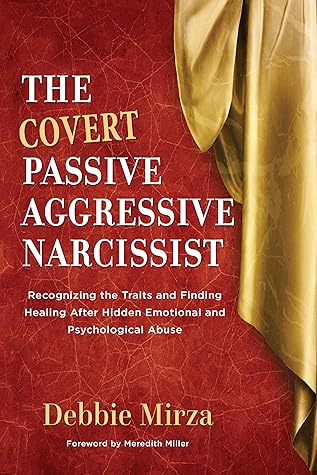More on this book
Community
Kindle Notes & Highlights
by
Debbie Mirza
Started reading
April 21, 2018
Plausible deniability is the covert narcissist’s greatest weapon in their arsenal of gaslighting tools.
You have been emotionally and psychologically abused and you are often the only one to see this
side of them while everyone around them thinks they are great. This furthers your confusion and minimizes your pain.
One reason covert narcissists are so damaging is because of cognitive dissonance.
“Could this person really have been controlling and manipulating me for years, and I didn’t see it… or were things really my fault and I’m just overdramatizing my experience?”
On the other hand, covert narcissists are well liked. They are charming and kind. They appear humble and empathetic. They can be good listeners and appear to really care. You can feel incredibly loved by them. They simultaneously make you feel terrible about yourself. They use cloaked tactics that you don’t see for years.
Sometimes you are the only one who sees it when your siblings still think their dad or mom is amazing and blame you for a plethora of things.
This can feel like a lonely road since oftentimes you are the only one who ever sees this side of the narcissist.
people who are kind, authentic, self-reflective, nurturing, loving, and caring people with a conscience. They look for energy supplies.
The difference is the covert narcissist hides their dark attributes because they want people to like them. Their reputation is extremely important to them.
It is common for people to be married to coverts for decades and not know they are married to one for most of the relationship. It is also common for people to be in dating relationships with covert narcissists that go on for years. Children of covertly narcissistic parents often do not realize the truth about their mom or dad until their thirties.
They know they must appear humble to be liked and revered.
are master manipulators.
They thrive off the attention of others.
People that think or act as if they are amazing are their energy supply.
Covert narcissists are likable to the outside world; they appear to be giving, humble, and kind. Image is the most important thing to them. These people are law-abiding citizens. They usually have well paying steady careers. They are not outwardly aggressive. You could know them for years and never see this side of them. This can change during the discard phase, which I’ll discuss in a later chapter. It is usually only the person that gets to know them intimately that sees the destructive traits. The rest of the world sees the façade, the “nice guy.” Many therapists don’t see through the mask
...more
Everyone loves them on a surface level.
They tend to not have long-lasting friendships with people that really know them deeply. They may have friends that have known them for years but don’t really know them.
You will feel like a covert thinks you are lazy, but they won’t actually say it.
It is common for a survivor to have a really hard time explaining what they have been through, because in their mind it doesn’t
sound that bad, and they fear people will think something is wrong with them.
This is called cognitive dissonance, having two competing thoughts in your mind at the same time.
how depressed they were for the majority of the relationship, how alone they felt, how they blamed their constant fatigue, health issues, and
sadness on other things, not realizing the toll the relationship was taking on their body and spirit.
This is where the groundwork is laid for you to fully trust and believe in this person for years to come. Because of your initial experience with them, you end up seeing everything they do through the lens of the solid view that this is someone who is a good person, someone who cares about you, and someone you can trust with your heart.
one woman who would watch her narcissistic mom observe other people’s insecurities and shower them with compliments and praise in those areas. The “targets” felt loved, seen, heard.
She only wanted to look good and be impressive.
They are on the same page it seems. This is an illusion the CN presents.
They learn your vulnerabilities and insecurities.
They will later use what they learn about you to trigger you, manipulate you, control you, and wound you in ways that feel like the biggest betrayal you have ever felt.
After a survivor has experienced the discard phase and discovers they have been living with a CN for years, they feel
embarrassed.
How did I not see this? How did I live with this for so long and be okay with it...
This highlight has been truncated due to consecutive passage length restrictions.
She was tired a lot, started experiencing allergies she had never had previously, she felt drained; like she didn’t have the life inside her she used to have. She never associated these things with her marriage; she thought she just needed to figure out how to find more fulfilling work in her life. Maybe she needed to change how she eats she thought, exercise more.


